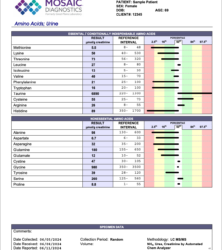Amino Acids
Amino acids are the building blocks for proteins, and proteins play a vital role in almost all biological activity in the human body. In fact, approximately 25% of our body is made up of protein. Our cells require a variety of nutrients to maintain their function, and we specifically need sugar, fat and protein to produce the energy currency that runs our body. Amino acids make up a large percentage of our cells.
Amino Acids – What Specific Functions Do They Participate In?
Amino acids amongst other things play a key role in energy metabolism within our cells. Without proper amino acid balance our cells ability to produce the energy currency chemical called ATP is significantly reduced. Without ATP production we run a deficit of cellular energy which compromises every organ system in our body including the brain and nervous system, heart and cardiovascular system, the digestive and musculoskeletal system, and immunity. Here is a short list of other functions of amino acids:
Responsible for wound healing and repair
Help remove waste material from cells
Needed for proper growth and maintenance of skin, hair, and nails
Important for muscle energy and repair
Amino Acids – Essential Amino Acids
Essential amino acids are those amino acids we must obtain from our diet. Our body doesn’t have the ability to produce these amino acids so we are dependent on food for a constant supply. These essential amino acids play a vital role in cellular metabolism and body function. Here is the list of essential amino acids:
- Histidine
- Isoleucine
- Leucine
- Lysine
- Methionine
- Phenylalanine
- Threonine
- Tryptophan
- Valine
A few amino acids on this list are noteworthy. Methionine is an amino acid that is central to a biochemical system called Methylation. Methylation is critical for higher cognitive function and is linked to language processing, attention, focusing, awareness, and memory. Without adequate methionine, methylation chemistry is significantly altered.
Another amino acid on the essential amino acid list is Tryptophan. Tryptophan is critically important for serotonin production. Serotonin is a neurotransmitter in the brain which is linked to mood, awareness, happiness, and fine and gross motor skills. Deficits in tryptophan can lead to deficits in serotonin which leads to depression.
Amino Acids – Non-Essential Amino Acids
Non-essential amino acids are those that our body can manufacture. They are still important, and a healthy diet is critical because vitamin and minerals from our food are what help amino acids and proteins function in unison to support overall cellular metabolism.
Here is a list of non-essential amino acids:
- Alanine
- Arginine
- Aspartic acid
- Cysteine
- Glutamic acid
- Glutamine
- Glycine
- Proline
A few amino acids are noteworthy on this list as well. Cysteine and glutamic acid are critically important for the formation of a powerful antioxidant in the body called glutathione. Glutathione is our cells powerhouse antioxidant and helps protect us against toxins. When glutathione runs low there is increase chance for cell damage and disease.
Amino Acids – Benefits of Testing
Testing for amino acids is important. This can be done through blood or urine sampling and provides measurement of amino acid balance or imbalances which helps in determining whether the diet is adequate or deficient. Sometimes amino acid supplements need to be implemented to bring amino acids into balance. Also, the amino acid test such as the Urine Amino Acids gives an idea of specific mineral and vitamin need to support overall amino acid metabolism.
Recommended: Foods With Amino Acids


